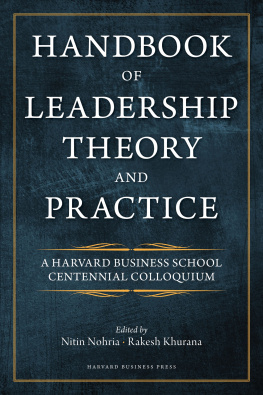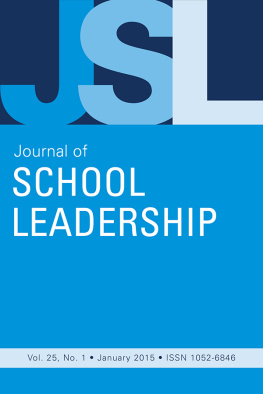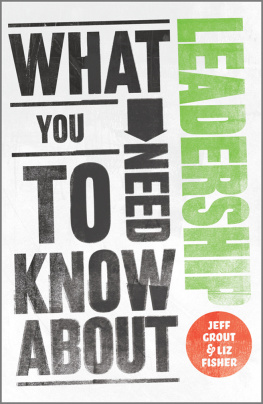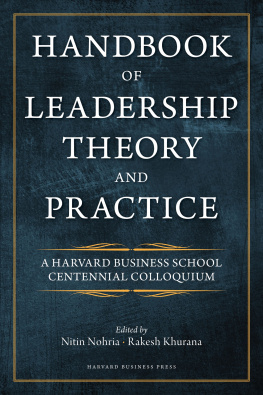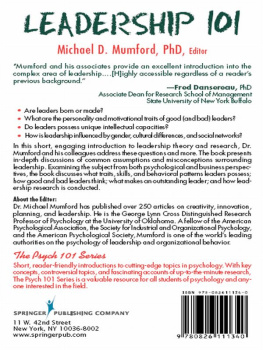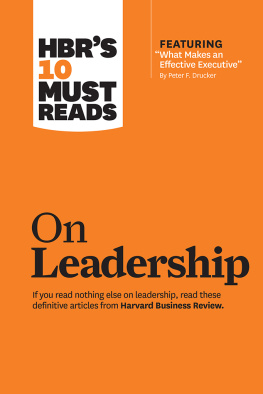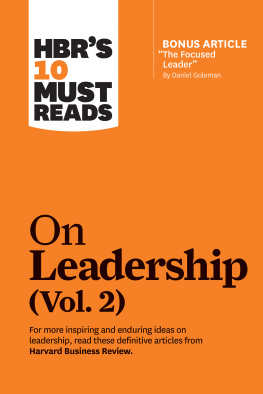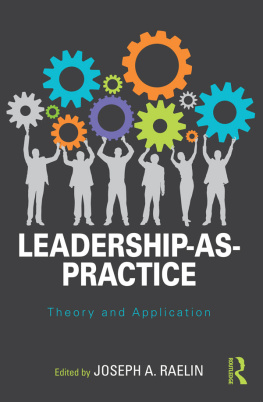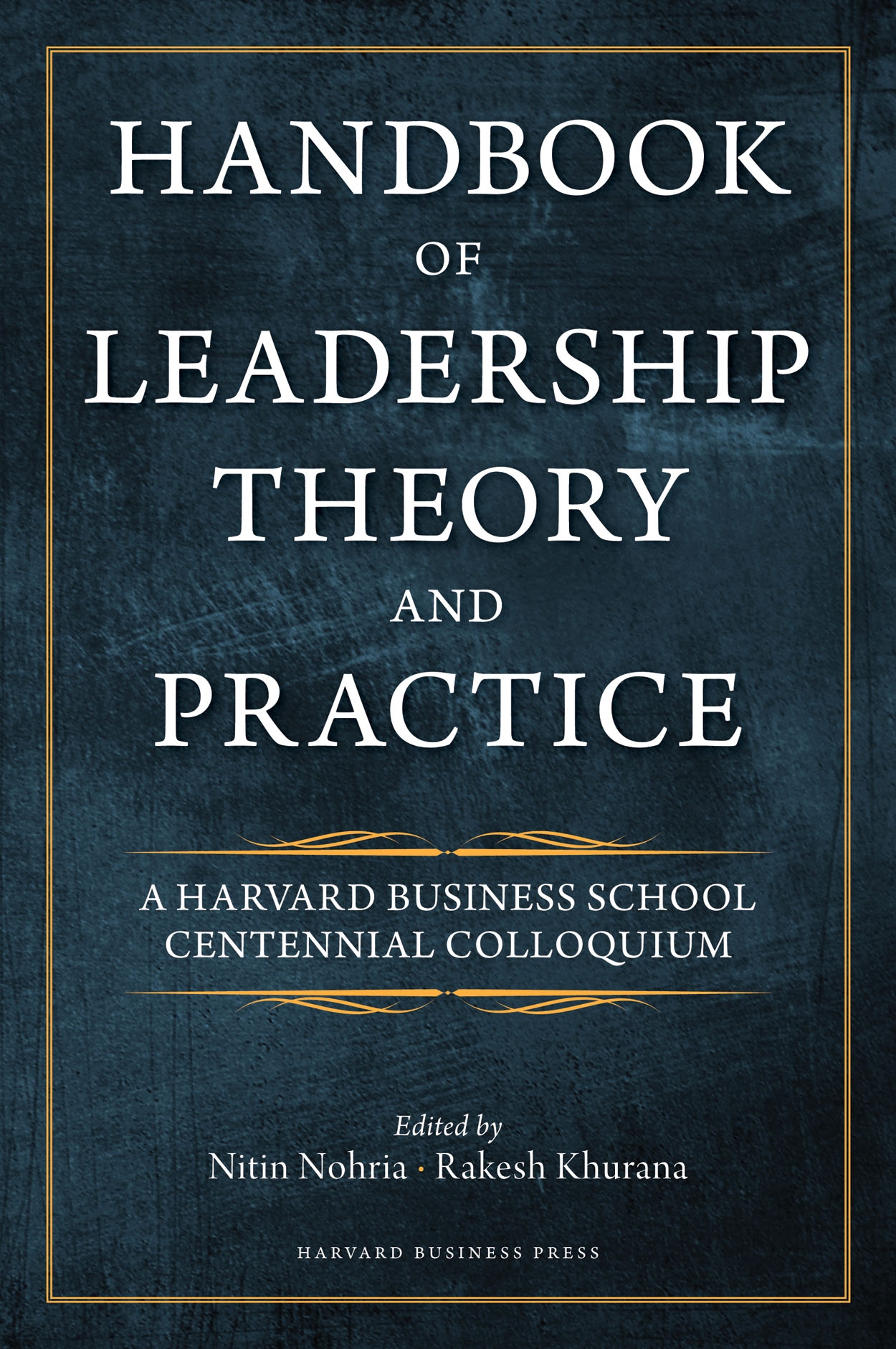ACKNOWLEDGMENTS
T HIS VOLUME resulted from a colloquium that was organized as part of the centennial celebrations of Harvard Business School. The centennial provided an extraordinary opportunity for the school, and for us as faculty members, to take stock of our past and to imagine our future. It is in this crucible of reflection that we discovered how far leadership research now lagged the espoused mission of most business schoolsto educate leadersand how urgent the need was to spur scholarship on this topic. We thank Harvard Business School and the organizers of our centennial events for the opportunity and resources to organize this conference and publish this edited volume. Special thanks go to Dean Jay Light, who was a champion of this project from the very start; to John Quelch, who was the overseer of the entire centennial celebration; to Warren McFarlan, whose unflagging support and endless resourcefulness enabled us to stretch our imaginations and do things we would not otherwise have dreamt of; and to Srikant Datar, who as dean of the Division of Research provided generous intellectual and financial resources.
Within Harvard Business School, our conference was organized under the aegis of the Leadership Initiative, an interdisciplinary initiative whose purpose is to stimulate leadership research and teaching across the school. We are grateful to Linda Hill, the chair of the initiative, for partnering with us every step of the way and for helping us convene this conference and produce this volume. We are equally thankful to Tony Mayo, the Director of the Leadership Initiative, who is the prototype of the quiet leadersomeone who leads without any need to be noticed, but without whom nothing would ever get done. We are just as thankful for the tireless behind the scenes support of the rest of the Leadership Initiative team, Letty Garcia and Amanda Pepper.
There arent enough words or ways that we can thank Meg Gardner, our conference coordinator. But for her countless e-mails, phone calls, reminders, and follow-ups, we would never have been able to organize ourselves, let alone the conference. It was her endless patience and infinite persistence that also ensured that the people we invited attended, and those we asked to write papers for the conference and this volume turned them in on time. Meg was also our interface with the rest of the HBS centennial organization, who helped us in many visible and invisible ways. We are especially grateful to Eileen Keohane and Chris Ramsay and their team from Harvards centennial planning committee.
The person whose generosity and creativity had the greatest impact on our colloquium was Maurizio Travaglini. He and his associates at Architects of Group Genius created a physical and intellectual space and a program that enabled all of us to have a dialogue on leadership that felt fresh and forward-looking. They were responsible for creating the spirit of the conference, and we will forever be grateful for that. They remind us that one of the most important leadership tasks is creating a space where good things can happen.
We are grateful to Deborah Blagg, Margaret Kelley, and especially Laura Singleton (who did the major share of this work) for preparing executive summaries of the articles in this book, which helped conference participants familiarize themselves with these ideas and participate in our discussions. Thanks in the same spirit are also due to Martha Spaulding from the Harvard Business Review , who helped write a great case that sparked a spirited discussion on the challenges of managing a diverse global leadership team, and to our colleague David Thomas, who led this case discussion with inimitable flair.
Organizing a conference and pulling together an edited volume is more work than we had imagined, and a lot of the unexpected burden fell on our assistants Debby Bell, Meredith Cook, and Clair Linzey, who bore it with good humor and grace. We are especially grateful to Clair for her tireless efforts in assembling the final volume to get it ready to send to our publishers, from working with authors to secure their permissions, to checking all the references and tables, to putting it all together in the right format and order.
Our editor at HBS Press, Melinda Merino, deserves a medal of honor for having the courage to pursue the publication of this book, which breaks so many of HBSPs norms. It is an edited volume, it is long, it is not aimed at a trade audience, and it is a big sprawling book on a big sprawling topic. Yet, Melinda always saw what we didthe need to promote serious scholarship on leadership and the possibility of this book to catalyze research in this important area. We are grateful for her support and her imagination, which will allow each of the chapters in this book to be available in electronic form, so that they can be ordered and assigned on an individual basis.
We owe a debt to our families, who patiently suffered our absence as we worked through the organization of this conference and the production of this edited volume.
We also want to thank Mike Jensen and Gregg Gordon, the founders of SSRN, who inspired and helped us launch the Leadership Research Network (LRN), an electronic journal that is part of the ever-expanding SSRN family. LRN will provide a place for leadership scholars to electronically publish both their work in progress and their published work, and help to disseminate it more quickly and broadly.
Last, but not least, we must thank the participants at our conference and the contributors to this volume. Leadership is a collective enterprise, and it is the joint effort and commitment of all who joined us and gave us their invaluable time and intellectual effort that has made this volume possible. Lets hope it fulfills our collective aspiration to stimulate new research in the field of leadership.
ABOUT THE CONTRIBUTORS
Bharat Anand is a professor in the Strategy Unit at Harvard Business School, where he teaches corporate strategy. He received an AB in economics, magna cum laude, from Harvard University and his PhD in economics from Princeton University, where he was also nominated to the Princeton Society of Fellows. Professor Anands research is in applied and empirical industrial organization, and corporate strategy, and he is currently examining competition in information goods markets, with a primary focus on media and entertainment. His research focuses on two central strategic challenges that firms face in these markets: the challenge of getting noticed among the increasing clutter of alternatives that are widely available to consumers, and the challenge that firms face in getting paid for what they produce, since property rights over inputs and outputs are often difficult to establish in these markets.
Bruce J. Avolio , PhD, is the Marion B. Ingersoll Professor of Management and Executive Director, Foster Center for Leadership, at the University of Washington. Avolio has published five books and more than one hundred articles on leadership. His books include Transformational and Charismatic Leadership: The Road Ahead (Elsevier Science, 2002), Full Leadership Development: Building the Vital Forces in Organizations (Sage Publications, 1999), and Developing Potential Across a Full Range of Leadership: Cases on Transactional and Transformational Leadership (Lawrence Erlbaum Associates, 2000). His newest books are Leadership Development in Balance: Made/Born (Lawrence Erlbaum Associates, 2005) and Authentic Leadership Development: Moments Matter (McGraw-Hill, 2005).
Marya L. Besharov is Assistant Professor of Organizational Behavior at Cornell School of Industrial Labor Relations. She attained her PhD in organizational behavior at Harvard University in 2008.

